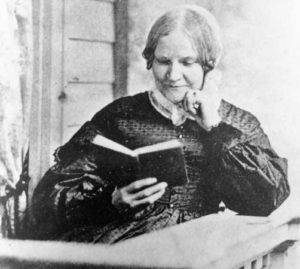
See image credit below.
In the 19th century, Lydia Maria Child’s name was nearly a household word.
An outspoken abolitionist, women’s rights supporter, and crusader for Native American rights, Child was also a prolific author. A journalist and editor, she wrote novels and short stories (often using fiction to express her anti-slavery views), poems and children’s books, and domestic manuals for wives and mothers.
Her most famous book – which went into 33 printings – was The Frugal Housewife, first published in 1829. Four years later, she published An Appeal in Favor of That Class of Americans Called Africans, believed to be the first anti-slavery book published in the United States. She also served as editor for Harriet Jacobs’s influential 1861 slave narrative, Incidents in the Life of a Slave Girl. In all, Child wrote more than 50 books.
Though Child was very prominent in her time, she comes down to us now primarily as the author of a poem originally published as “The New-England Boy’s Song about Thanksgiving Day” – more popularly known to us as “Over the River and Through the Wood.” It was included in her 1844 book, Flowers for Children. The poem features Child’s reminiscences about visiting her grandfather’s house during the cold New England winters.
The Poetry Foundation, which credits her with being one of the most important American women writers of the 19th century, provides an outstanding overview of Child’s life and work: “She wrote one of the earliest American historical novels, the first comprehensive history of American slavery, and the first comparative history of women. In addition, she edited the first American children’s magazine, compiled an early primer for the freed slaves, and published the first book designed for the elderly.”
Two other excellent introductions to Child can be found at American National Biography Online and the History of American Women website. You can visit Transcendentalists.com to consider Child’s relationship to other New England thinkers and writers of the time. Her work is also included in the Library of Congress’s “American Women” project. Look for her especially in the section titled “Reform Efforts.”
If you want to go even further in your exploration of this key 19th-century writer, you might want to read Lori Kenschaft’s book Lydia Maria Child: The Quest for Racial Justice or Carolyn L. Karcher’s book The First Woman in the Republic: A Cultural Biography of Lydia Maria Child
. A Lydia Maria Child Reader
is also available. And believe it or not, you can still buy a copy of The American Frugal Housewife
.
Not surprisingly, many children’s picture books have taken “Over the River and Through the Wood” as their subject. I am particularly enchanted with Mary Engelbreit’s version. Another lovely book is Over the River and Through the Wood: An Anthology of Nineteenth-Century American Children’s Poetry
.
Wherever Thanksgiving Day finds you this year, take a moment to revisit Lydia Maria Child’s classic poem celebrating the holiday.
Podcast: Play in new window | Download
Subscribe to StoryWeb in iTunes.Listen to the podcast in Stitcher.
Image Credit: Lydia Maria Child reading a book about 1870. Public domain. https://commons.wikimedia.org/wiki/File:Lydia_Maria_Child.jpg.
